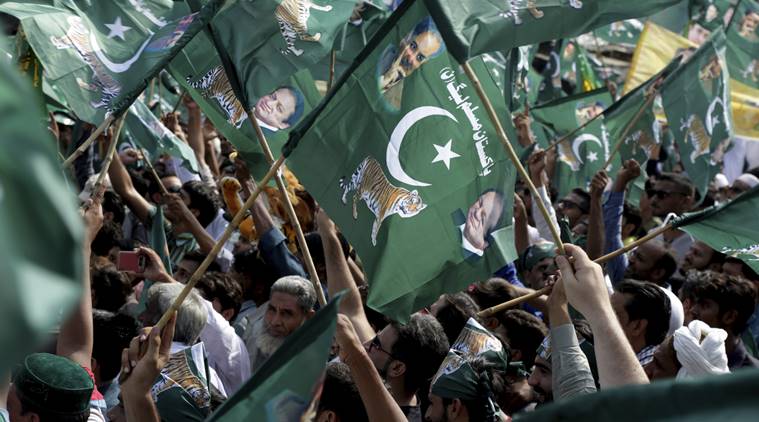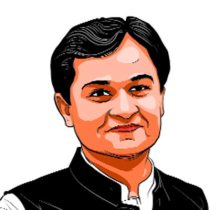Army vs Nawaz Sharif
Pakistan goes into an election as army trips government, coopts judiciary, coerces media into submission

The present election is about whether Sharif and his allies can prevail over the army’s allies through the ballot and thereby reverse the lopsided civil-military balance in Pakistan. (AP/PTI Photo)
Pakistan will hold its 11th general election since 1970 today, only the second that would result in an uninterrupted transfer of power from one nominally democratic dispensation to the next. In 2008, Pakistan had transitioned from an overt military rule to a façade of democracy. While the centre-left Pakistan People’s Party (PPP) formed a coalition government then, the country’s all-powerful army really has held the power since. The ousted dictator, General Pervez Musharraf, was sent off with a guard of honour. The Army subsequently maintained its chokehold over the country’s foreign and national security policies as well as key domestic affairs.
Pakistan Election 2018 LIVE UPDATES
The 2013 polls saw the country’s first peaceful transition from one elected government to the next, led by Nawaz Sharif’s Pakistan Muslim League-Nawaz (PML-N). Sharif’s tiff with the army started right off the bat. Having been ousted indirectly and directly by the army twice before, Sharif was bent on bringing Musharraf to book and even threatened to make public the Kargil debacle report. He also chose to pursue a policy of reconciliation with the neighbouring countries, especially India, and, to the army’s chagrin, attended Prime Minister Narendra Modi’s 2014 inauguration.
The stage was thus set for the army, which has ruled Pakistan directly for over 30 years, and indirectly for the rest, to lock horns with Sharif. The army propped up the playboy cricketer-turned-politician Imran Khan and his party, Pakistan Tehrik-e-Insaf (PTI or Pakistan Justice Movement), to bring Sharif down through street protests. Khan held Islamabad hostage through a dharna in 2014 and twice thereafter in an attempt to dislodge the Sharif government. An unexpected break for the army came in the form of the so-called Panama Papers leak, in which Sharif’s children were named for holding off-shore companies and properties. The army exploited the Panama papers to the fullest, first forcing Sharif via protests by the PTI, to hold a judicial inquiry, and subsequently by leaning on the judiciary to fast-track the proceedings and declare the three-time PM guilty. The judiciary, which has been the handmaiden of the Pakistani army since the first coup d’état in the 1950s, dislodged Sharif on the flimsiest legal grounds. Days before the present elections, the judiciary dispatched Sharif and his political heir apparent, Maryam Nawaz Sharif, to prison.
In addition to nailing Nawaz Sharif, the army has worked on overdrive to tame the Pakistani media. It has targeted, harassed and gagged columnists and newspersons as well as the country’s largest media houses viz. the Geo/Jang Group and the Dawn Group. The army has explicitly told newspapers to drop columnists and purge stories. It prevented the delivery of the Jang and Dawn newspapers in cantonment areas and blacked out their TV channels to the extent that the former group apparently made peace with the army while the latter took to the BBC to air its grievances. The army hounded social media as well and went to the extent of abducting pro-democracy bloggers and opinion-makers. The net effect of this muzzling was that the media was coerced into self-censorship and most outlets, especially TV channels, ended up singing the paeans of the army and its blue-eyed man, Imran Khan. It is in this backdrop of the army tripping an elected government, coopting the judiciary and coercing the media into submission, that Pakistan goes to an election today.
Despite the media and judiciary’s collusion, the army and its PTI quislings are not sure of the outcome as Nawaz Sharif remains popular in his home province of Punjab, which also holds the most seats in the national assembly, and thus, the key to power. The elections are too close to call with the contest being among the outgoing PML-N and the challenger PTI, with the PPP being a distant third. However, hell bent on denying Sharif an electoral victory, the army has already done everything to ensure PML-N loses. It has proactively inducted — dubbed euphemistically as mainstreaming — the political fronts of jihadi-terrorist groups, Jamat-ud-Dawa, Ahle-Sunnat-Wal-Jamaat and the Tehrik-e-Labbaik Ya Rasulallah, into the electoral fray. These disparate groups that are Salafi, Deobandi and Barelvi, respectively, have two things in common — an anti-Sharif sentiment and the army’s backing. The plan was to have these obscurantist groups chip away at the PML-N’s conservative voter base. Additionally, Imran Khan — whose ex-wife has charged him with sexual promiscuity and hard drugs abuse — has been peddling a bigoted religious refrain against Pakistan’s beleaguered religious minority, the Ahmadiyyah. An odious religious narrative was commissioned by the army to ensnare Nawaz Sharif, ostensibly the only leader since Benazir Bhutto who could challenge the army’s preeminence in the Pakistani polity. Similarly, the army has tried to undercut the PPP in its Sindh province stronghold by propping up an electoral arrangement of its opponents called the Grand Democratic Alliance despite the PPP’s tacit indications to the army that it would be content to play second fiddle to it.
In contrast to Nawaz Sharif, his brother Shehbaz Sharif is considered acceptable to the army due to his limited provincial stature and pliable political nature. It is hard to say whether the army would prefer the younger Sharif over Imran Khan, who has been tight with the army but is deemed a maverick nonetheless. The army’s political engineering notwithstanding, the current elections remain a toss-up. The PML-N and the PTI are neck-and-neck with each other in Punjab — the electoral grand prize. In Khyber-Pakhtunkhwa province, a three- or even four-way split between the PTI, the Pashtun nationalist Awami National Party, the PML-N and others is a foregone conclusion. The PPP will retain a plurality, if not its majority, in the Sindh province. The restive Balochistan province will deliver a fractured mandate as always, split equally among the Pashtun and Baloch nationalists, the Islamists and the pro-army political cliques. If the PML-N is able to muster a large voter turnout, it may still defeat the army and the PTI’s best designs and eke out a plurality in the national assembly and end up being a formidable opposition if not a weak coalition government.
Foreign policy and regional affairs were off the campaign radar. The army’s firm grip over the pre-electoral process, the narrative and multitude of prime ministerial candidates, if not the outcome, however, pretty much guarantees that the incoming political dispensation will toe the junta’s line vis-à-vis India, Afghanistan and the US, while keeping the relationship with China steady.
The army thought it had purged the foremost challenger to its political clout. However, by returning to Pakistan, Sharif has thrown a spanner in the army’s works. The present election is about whether Sharif and his allies can prevail over the army’s allies through the ballot and thereby reverse the lopsided civil-military balance in Pakistan. The only thing certain at this point is that Pakistan is headed for prolonged political uncertainty.
The writer is a Pakistani-American columnist
For all the latest Opinion News, download Indian Express App
More From Mohammad Taqi
- A murder in KarachiAs army’s jihadist house of cards unravels, it is causing a blowback within Pakistan and for its neighbours...
- Asia’s Bleeding HeartThat’s what Pakistan’s broken pledges have reduced Afghanistan to...
- They shut down my columnUnder General Sharif, the Pakistan army is carrying out a low-intensity war against diversity of opinion...








































No hay comentarios:
Publicar un comentario